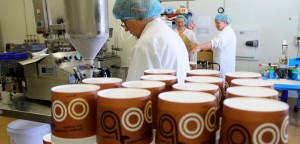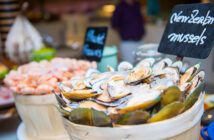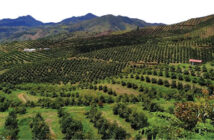
They may be small and unassuming, but blueberries pack a massive antioxidant punch. Kiwi company oob is harnessing the taste and health benefits of its organic berries to conquer the competitive domestic and export food markets.
They may be small and unassuming, but blueberries pack a massive antioxidant punch. Kiwi company oob is harnessing the taste and health benefits of its organic berries to conquer the competitive domestic and export food markets.
It’s been an exciting journey for organic berry grower oob. Based in Omaha on the Tawharanui Peninsula, the innovative company has successfully expanded its offering and markets over the past 15 years, and earned a reputation for quality organic products.
Co-founder Shannon Auton says the business began as a blueberry orchard. But, before long, she and husband Robert decided to step things up by either increasing the size of the orchard to achieve scale or diversifying.
“We chose to diversify into value-added products,” says Shannon. “Initially, this was frozen blueberries, and then we began making small amounts of organic blueberry ice-cream and sorbet.”
With the addition of an on-site ice-cream factory, oob expanded its ice-cream range further and added ice blocks, frozen raspberries and blueberry juice to the mix – all of it organic, naturally.
“Yes, diversifying into ice-cream was a risky step,” admits Shannon, “but risk is all part of business. It’s certainly been a steep curve. But we recognised that the organic market in New Zealand was limited so we decided to conquer that.”
Having established the brand locally – Foodstuffs and Progressive supermarkets, as well as specialty stores around New Zealand stock oob frozen berries and ice-cream – oob made a strategic decision to work with Woolworths and Coles supermarkets in Australia.
“To achieve our scale objective, we knew we couldn’t just sell here,” explains Shannon. “For a lot of New Zealand businesses, going into Australia is a natural progression and we’ve trodden a path that’s been well walked by other New Zealand companies.”
Establishing the relationship with Woolworths Australia was worth the time and effort. oob currently sells into Coles and 1700 Woolworths stores, and has an organic distributor in Perth.
“The organic market in Australian supermarkets is relatively limited. We were the first company to supply the supermarkets over there with organic fruit to any scale. Our aim is to own the organic segment in the frozen section of supermarkets in Australasia.”
Exports account for 65 percent of oob’s annual turnover and the company has now branched into Asia, with distributors in Singapore and Malaysia, and an agent in China. Ensuring its branding remains strong in those markets is important, says Shannon.
“The only change we’ve made is putting Chinese writing on our packaging. We’ve found that everyone that wants our product, doesn’t want us to change our packaging. We’re really clear about the value of our brand, so we’ve chosen not to sell to certain customers who asked to put their logo on our products.”
oob’s biggest growth area is frozen berries into Australia, and keeping up with demand is a constant juggle. During the recent Hepatitis A scare across the Tasman, the company sold through six weeks’ worth of berry supplies in just two weeks.
Events like this aside, demand for oob’s products is increasing, so the company supplements its local fruit production with supplies from Chile, the US, Serbia, Mexico, Turkey and elsewhere.
“People often ask why we don’t source all our fruit out of New Zealand. It’s simply because there aren’t enough people growing organically. All our international growers and suppliers meet rigorous certification standards, and the quality is as good as – and sometimes better than – New Zealand produce.”
To keep things tracking well, Shannon stresses the importance of careful logistics and planning. But even with rigorous planning and forecasting systems, unforeseen events can occur.
“Many things can go wrong. We’ve had train crashes; a crane fell over on the wharf delaying the container; and a storm here overnight cut our power to the ice-cream factory. That’s why you need really strong relationships with suppliers so they understand when things go wrong. You try to hold enough stock in the destination country, but not so much that you’re stockpiling and it’s costing you money to warehouse.”
Having entered Asia, the company’s strategy over the next 18 months is to focus on serving those markets well and consolidating internally.
“We’ve learnt in all our markets that when you’re working with organic, the growth is incremental. It’s about being able to do the sell to the supermarkets and explain that it does take a while to get established.
“Australia and Asia is enough for us right now. You have to be careful when you get larger that it’s not the tail wagging the dog. I’m more internally focused now than ever, looking at how we can improve efficiencies and run things better. Back when we were young and naïve it was about getting the next deal.”
NZTE is the government’s international business development agency. Find more international insights at www.nzte.govt.nz and twitter.com/NZTEnews.




























































































